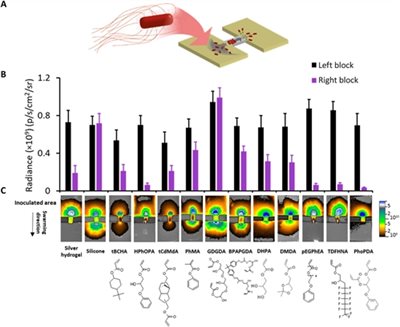
Swarming of Proteus over polymer-coated catheter segments
Researchers at the University of Nottingham have discovered a new coating that could prevent bacterial infections typically caused by biofilms on catheters.
The new material – an acrylate copolymer and a first of its kind – is resistant to single and multi-species bacterial biofilm formation, swarming, encrustation and host protein deposition, which are all major challenges associated with preventing catheter-associated urinary tract infections (CAUTIs).
This research was led by Professors Morgan Alexander and Paul Williams and was co- first authored by Jean Dubern. Professor Derek Irvine of the Centre for Additive Manufacturing, Faculty of Engineering, developed the appropriate processing regime to generate the correct copolymers.
The research was a broad collaboration between the University of Nottingham’s National Biofilms Innovation Centre, School of Life Sciences; Advanced Materials and Healthcare Technologies, School of Pharmacy, Division of Gastrointestinal Surgery, Nottingham Digestive Diseases Centre NIHR Biomedical Research Unit and Nottingham University Hospitals NHS Trust.
Indwelling urinary tract catheters are the most commonly used prosthetic medical devices with some 15 to 25% of patients requiring bladder catheterization during hospitalization. However, they promote CAUTIs, which are responsible for some 75 to 80% of hospital-acquired urinary tract infections occurring annually worldwide.
In 2012, the researchers discovered a material that prevented bacterial biofilms being formed by Pseudomonas aeruginosa, Staphylococcus aureus and Escherichia coli. P. aeruginosa and S. aureus are problematic for device-associated infections generally, whilst E. coli commonly causes CAUTIs.
The new research builds on this previous work over a period of more than 10 years with tests against the bacterial pathogen Proteus mirabilis – specifically its ability to swarm and cause catheter encrustation – which is unique to CAUTIs.
Proteus mirabilis has a unique ability to swarm and form large bacterial ‘rafts’ on hard surfaces that cover large distances, for example, up the length of a catheter into the bladder. It is also responsible for driving biomineralization or encrustation, inside the catheter which results in blockages that can lead to serious kidney infections and septicaemia. Encrustation around the outside makes removal of catheters extremely painful for patients.
Andrew Hook, Assistant Professor, School of Pharmacy, said: “We always had this lingering question as to whether the material that we previously discovered prevented biofilm formation, could be modified to prevent swarming and biomineralization”.
“We have tested more than 450 acrylate polymers and discovered that by combining two different monomers we could create a new material that is all-encompassing and prevents multi-species biofilm formation, swarming and biomineralization. This is totally unique and currently the only biomaterial capable of preventing swarming that we are aware of.”
Paul Williams, Professor of Molecular Microbiology, Biodiscovery Institute and School of Life Sciences comments: “We were also delighted to confirm the clinical potential of our new copolymer, which resisted biofilm formation after exposure to urine from catheterized patients and was non-toxic in laboratory tests.
“Our breakthrough should be great news for clinicians and patients when it comes to urinary tract catheterisation. We’re hopeful that this could mark a step-change in the management of CAUTIs in the future and help to dramatically reduce the number of CAUTIs in patients in hospital and other healthcare settings.”
It has been published in the journal Science Advances and the full paper can be viewed here.
Posted on Friday 3rd March 2023